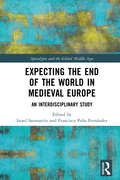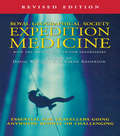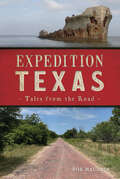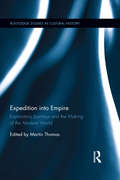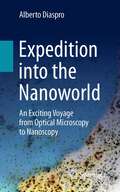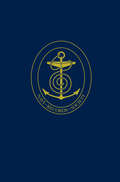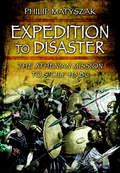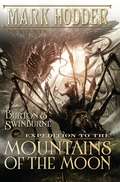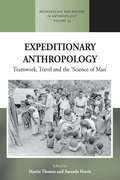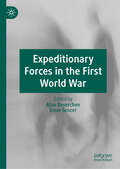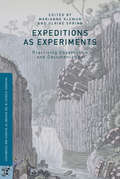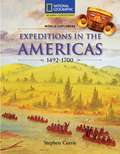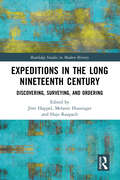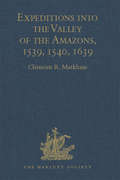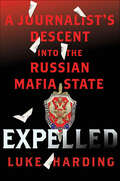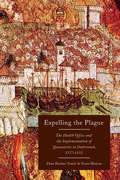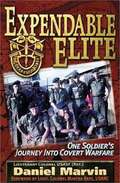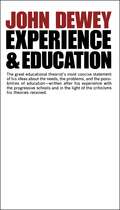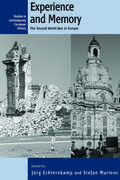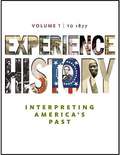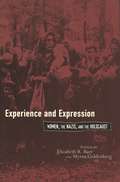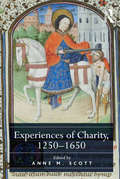- Table View
- List View
Expecting the End of the World in Medieval Europe: An Interdisciplinary Study (Apocalypse and the Global Middle Ages)
by Israel Sanmartín Francisco Peña FernándezExpecting the End of the World in Medieval Europe: An Interdisciplinary Study examines the phenomenon of medieval eschatology from a global perspective, both geographically and intellectually. The collected contributions analyze texts, authors, social movements, and cultural representations covering a wide period, from the 6th to the 16th century, in geographically liminal spaces where Catholic, Byzantine, Islamic, and Jewish cultures converged.The book is organized in eleven chapters which reflect and explore the following arguments: the study of specific eschatological episodes in medieval Europe and their interpretations; the analysis of apocalyptic visionaries, apocalyptic authors, and their individual contributions; the social and political implications of eschatology in medieval society; the study of medieval apocalyptic literature from a rhetorical, narratological, and historiographical perspective; the history of the transmission of apocalyptic literature and its transformation over time; and a comparative examination of apocalypticism between the Middle Ages and the Early Modern era.This study provides a lens through which academics, specialists, and interested researchers can observe and reflect on this entire eschatological universe, dwelling both on well-known texts, authors, and events, and on others which are much less popular. In gathering different paradigms, tools, and theoretical frameworks, the book exposes readers to the complex reality of medieval anxiety regarding the end of the world.
Expedition Medicine: Revised Edition (Oxford Medical Handbooks Ser.)
by Sarah Anderson David WarrellThis is a completely rewritten and revised second edition of the now standard text, prepared under the auspices of the Royal Geographical Society of Great Britain. Comprehensively updated to take into account new research findings and medicines, and adapted for the American explorer, Expedition Medicine is written by renowned experts in their fields and provides a wealth of practical tips and advice, as well as extensive details about first aid kits, emergency procedures, and evacuation routines. Coverage includes sections on every kind of travel from desert to mountain, canoeing to diving, and off-road driving to walking, with valuable information on vaccinations, medicines, and hygiene.
Expedition Texas: Tales from the Road (The\history Press Ser.)
by Bob MauldinIf the weathered landmarks and forgotten trails of the Lone Star State could talk, this is what they might say.The TV show Expedition Texas brings to life stories of abandoned buildings, ghost towns and other lost Texas history locations. Hit the road with Bob Mauldin and his crew and hear the stories behind the stories. Venture deep beneath the surface to explore a missile launch site. Climb crumbling stairs high above the ground to the top of amazing historical hotels. There's lost history all over Texas. And, on Expedition Texas, we're gonna find it.
Expedition into Empire: Exploratory Journeys and the Making of the Modern World (Routledge Studies in Cultural History #31)
by Martin ThomasExpeditionary journeys have shaped our world, but the expedition as a cultural form is rarely scrutinized. This book is the first major investigation of the conventions and social practices embedded in team-based exploration. In probing the politics of expedition making, this volume is itself a pioneering journey through the cultures of empire. With contributions from established and emerging scholars, Expedition into Empire plots the rise and transformation of expeditionary journeys from the eighteenth century until the present. Conceived as a series of spotlights on imperial travel and colonial expansion, it roves widely: from the metropolitan centers to the ends of the earth. This collection is both rigorous and accessible, containing lively case studies from writers long immersed in exploration, travel literature, and the dynamics of cross-cultural encounter.
Expedition into the Nanoworld: An Exciting Voyage from Optical Microscopy to Nanoscopy
by Alberto DiasproThe story of microscopy over the years is one of wonder, revelation, and even love. What better words could there be to describe the amazing things that we have been able to see, learn and accomplish thanks to the progress made in this field? A love story between a pieace of glass and the rainbow with an original soundtrack mad of poetry and music. From Galilei’s initial foray into basic optical microscopy, including the Camillo Golgi and Giuliano Toraldo di Francia lessons, to such later developments as time-resolved microscopy, multi-photon microscopy and three-dimensional microscopy to innovations such as optical nanoscopy, bioimaging and super resolution imaging, the book seeks to take the reader, be they scientist or layperson, on a journey through the evolution of the microscope and its many uses, including in the field of medicine. The author uses visible light as a through-line to unite the various chapters, as well as using fluorescence as a touchpoint from which to map the changes in the science, a significant choice, as it, along with label-free approaches and the addition of artificial intelligence, form the natural environment for development of the modern multi-messenger microscope towards bioimaging at the nanoscale.
Expedition of Sir John Norris and Sir Francis Drake to Spain and Portugal, 1589
by R.B. WernhamActions against the Spanish Armada and campaigns in the Netherlands left the Queen’s coffers empty. For this reason proposals to capture the Spanish treasure fleet were given royal support. The treasure fleet homeward bound from the Americas would be intercepted in the Azores. A diversion at Santander to damage the Spanish fleet would prevent protection of the treasure fleet and, more importantly, prevent further actions against England or Ireland. However, the project was diverted further with backers wanting to re-instate Don Antonio as King of Portugal, with ideas of gaining lucrative Portuguese trade rights.At sea a further diversion was taken, with news of shipping at Corunna and the prospect of capturing merchantmen. ‘Profit was already challenging strategy’. This diversion gave their enemies more time to prepare. The failure at Lisbon was partly from a lack of co-ordination between the navy and army but also from the lack of promised support from Don Antonio’s supporters.The decision to sail for the Azores to intercept the Spanish treasure fleet was at last made only for Drake to be driven back to England by a storm. Short of supplies and with sick crews the ships were in no condition to continue with the Queen’s demands so there was no great treasure and the Spanish fleet was still in being. The sale of prizes and their contents failed to cover the cost of the expedition, and so the expedition was considered a financial and strategic failure.
Expedition to Disaster: The Athenian Mission to Sicily 415 BC
by Philip MatyszakThis thrillingly vivid history recounts a pivotal battle of the Peloponnesian War, bringing the drama and personalities of the Sicilian Expedition to life. The Athenian expedition to conquer Sicily was one of the most significant military events of the classical period. At the time, Athens was locked in a decades-long struggle with Sparta for mastery of the Greek world. The expedition to Sicily was intended to win Athens the extra money and resources needed to crush the Spartans. With the aid of new archaeological discoveries, Expedition to Disaster reconstructs the mission, and the ensuing siege, in greater detail than ever before. The cast of characters includes Alcibiades, the flamboyant, charismatic young aristocrat; Nicias, the ageing, reluctant commander of the ill-fated expedition, and Gylippus, the grim Spartan general sent to command the defense of Syracuse. It was he who turned the tables on the Athenian invaders. They were surrounded, besieged, and forced to ask for mercy from a man who had none. Philip Matyszak's combination of thorough research and gripping narrative presents an episode of ancient history packed with colorful characters and dramatic tension.
Expedition to the Mountains of the Moon (A Burton & Swinburne Adventure #3)
by Mark HodderIt is 1863, but not the one it should be. Time has veered wildly off course, and now the first moves are being made that will lead to a devastating world war and the fall of the British Empire. Caught in a tangled web of cause, effect, and inevitability, little does Burton realize that the stakes are far higher than even he suspects. A final confrontation comes in the mist-shrouded Mountains of the Moon, in war- torn Africa of 1914, and in Green Park, London, where, in the year 1840, Burton must face the man responsible for altering time: Spring Heeled Jack! Burton and Swinburne's third adventure is filled with eccentric steam-driven technology, grotesque characters, and bizarre events, completing the three-volume story arc begun in The Strange Affair of Spring Heeled Jack and The Curious Case of the Clockwork Man.
Expeditionary Anthropology: Teamwork, Travel and the ''Science of Man'' (Methodology & History in Anthropology #33)
by Martin Thomas Amanda HarrisThe origins of anthropology lie in expeditionary journeys. But since the rise of immersive fieldwork, usually by a sole investigator, the older tradition of team-based social research has been largely eclipsed. Expeditionary Anthropology argues that expeditions have much to tell us about anthropologists and the people they studied. The book charts the diversity of anthropological expeditions and analyzes the often passionate arguments they provoked. Drawing on recent developments in gender studies, indigenous studies, and the history of science, the book argues that even today, the ‘science of man’ is deeply inscribed by its connections with expeditionary travel.
Expeditionary Forces in the First World War
by Emre Sencer Alan BeyerchenWhen war engulfed Europe in 1914, the conflict quickly took on global dimensions. Although fighting erupted in Africa and Asia, the Great War primarily pulled troops from around the world into Europe and the Ottoman Empire. Amid the fighting were large numbers of expeditionary forces—and yet they have remained largely unstudied as a collective phenomenon, along with the term “expeditionary force” itself. This collection examines the expeditionary experience through a wide range of case studies. They cover major themes such as the recruitment, transport, and supply of far-flung troops; the cultural and linguistic dissonance, as well as gender relations, navigated by soldiers in foreign lands; the political challenge of providing a rationale to justify their dislocation and sacrifice; and the role of memory and memorialization. Together, these essays open up new avenues for understanding the experiences of soldiers who fought the First World War far from home.
Expeditions as Experiments
by Marianne Klemun Ulrike SpringThis collection focuses on different expeditions and their role in the process of knowledge acquisition from the eighteenth century onwards. It investigates various forms of scientific practice conducted during, after and before expeditions, and it places this discussion into the scientific context of experiments. In treating expeditions as experiments in a heuristic sense, we also propose that the expedition is a variation on the laboratory in which different practices can be conducted and where the transformation of uncertain into certain knowledge is tested. The experimental positioning of the expedition brings together an ensemble of techniques, strategies, material agents and social actors, and illuminates the steps leading from observation to facts and documentation. The chapters show the variety of scientific interests that motivated expeditions with their focus on natural history, geology, ichthyology, botany, zoology, helminthology, speleology, physical anthropology, oceanography, meteorology and magnetism.
Expeditions in the Americas, 1492-1700
by Stephen CurrieExplains why Europeans were interested in the Indies during the 1400s and 1500s. Describes Columbus' journey to the Western Hemisphere and explains how he was mistaken in thinking that he had reached the Spice Islands. Identifies parts of a caravel and carrack. Compares and contrasts European and Native American views on Cortés' invasion of Mexico. Traces La Salle's journey down the Mississippi River.
Expeditions in the Long Nineteenth Century: Discovering, Surveying, and Ordering (Routledge Studies in Modern History)
by Jörn Happel Melanie Hussinger Hajo RaupachThis book examines the processes of scientific, cultural, political, technical, colonial and violent appropriation during the 19th century. The 19th century was the century of world travel. The earth was explored, surveyed, described, illustrated, and categorized. Travelogues became world bestsellers. Modern technology accompanied the travelers and adventurers: clocks, a postal and telegraph system, surveying equipment, and cameras. The world grew together faster and faster. Previously unknown places became better known: the highest peaks, the coldest spots, the hottest deserts, and the most remote cities. Knowledge about the white spots of the earth was systematically collected. Those who made a name for themselves in the 19th century are still read today. Alexander von Humboldt or Charles Darwin made the epoch a scientific heyday. Ida Pfeiffer or Isabelle Bird (Bishop) traveled to distant continents and took their readers at home on insightful journeys. Hermann Vámbéry or Sir Richard Burton got to know the most remote languages and regions. There are countless travel reports about a fascinating century, which, with surveying and exploration, also brought colonial conquest and exploitation into the world. In ten individual studies, the authors explore travelers from all over the world and analyze their successes. The unifying element of all the studies is the experience of distance and its communication by means of travelogues to the armchair travelers who have stayed at home.This volume will be of value to students and scholars both interested in modern history, social and cultural history, and the history of science and technology.
Expeditions into the Valley of the Amazons, 1539, 1540, 1639 (Hakluyt Society, First Series #24)
by Clements R. MarkhamIncludes the following accounts: Expedition of Gonzalo Pizarro to the land of Cinnamon, A.D. 1539-42, translated from the 2d pt. of Garcilasso Inca de la Vega's 'Royal commentaries of Peru'; The voyage of Francisco de Orellana down the river of the Amazons, A.D. 1540-1, translated from the sixth decade of A. de Herrera's 'General history of the western Indies'; New discovery of the great river of the Amazons, by 'Father Cristóbal de Acuña, A.D. 1639, translated from the Spanish edition of 1641. With a 'List of the Principal Tribes of the Valley of the Amazons'. Translated and Edited, with Notes. The supplementary material includes the 1859 annual report. This is a new print-on-demand hardback edition of the volume first published in 1859.
Expelled: A Journalist's Descent into the Russian Mafia State
by Luke HardingIn 2007 Luke Harding arrived in Moscow to take up a new job as a correspondent for the British newspaper, The Guardian. Within months, mysterious agents from Russia's Federal Security Service --the successor to the KGB--had broken into his apartment. He found himself tailed by men in leather jackets, bugged, and even summoned to the KGB's notorious prison, Lefortovo. The break-in was the beginning of an extraordinary psychological war against the journalist and his family. Windows left open in his children's bedroom, secret police agents tailing Harding on the street, and customs agents harassing the family as they left and entered the country became the norm. The campaign of persecution burst into the open in 2011 when the Kremlin expelled Harding from Moscow--the first western reporter to be deported from Russia since the days of the Cold War. Expelled is a brilliant and haunting account of the insidious methods used by a resurgent Kremlin against its so-called "enemies"--human rights workers, western diplomats, journalists and opposition activists. It includes illuminating diplomatic cables which describe Russia as a "virtual mafia state". Harding gives a personal and compelling portrait of Russia that--in its bid to remain a superpower--is descending into a corrupt police state.
Expelling the Plague
by Zlata Blazina Tomic Vesna BlazinaA vibrant city-state on the Adriatic sea, Dubrovnik, also known as Ragusa, was a hub for the international trade between Europe and the Ottoman Empire. As a result, the city suffered frequent outbreaks of plague. Through a comprehensive analysis of these epidemics in Dubrovnik, Expelling the Plague explores the increasingly sophisticated plague control regulations that were adopted by the city and implemented by its health officials. In 1377, Dubrovnik became the first city in the world to develop and implement quarantine legislation, and in 1390 it established the earliest recorded permanent Health Office. The city's preoccupation with plague control and the powers granted to its Health Office led to a rich archival record chronicling the city's experience of plague, its attempts to safeguard public health, and the social effects of its practices of quarantine, prosecution, and punishment. These sources form the foundation of the authors' analysis, in particular the manuscript Libro deli Signori Chazamorbi, 1500-30, a rare health record of the 1526-27 calamitous plague epidemic. Teeming with real people across the spectrum, including gravediggers, laundresses, and plague survivors, it contains the testimonies collected during trial proceedings conducted by health officials against violators of public health regulations. Outlining the contributions of Dubrovnik in conceiving and establishing early public health measures in Europe, Expelling the Plague reveals how health concerns of the past greatly resemble contemporary anxieties about battling epidemics such as SARS, avian flu, and the Ebola virus.
Expelling the Plague: The Health Office and the Implementation of Quarantine in Dubrovnik, 1377-1533 (McGill-Queen's/Associated Medical Services Studies in the History of Medicine, Health, and Society)
by Vesna Blazina Zlata Blazina TomicA vibrant city-state on the Adriatic sea, Dubrovnik, also known as Ragusa, was a hub for the international trade between Europe and the Ottoman Empire. As a result, the city suffered frequent outbreaks of plague. Through a comprehensive analysis of these epidemics in Dubrovnik, Expelling the Plague explores the increasingly sophisticated plague control regulations that were adopted by the city and implemented by its health officials. In 1377, Dubrovnik became the first city in the world to develop and implement quarantine legislation, and in 1390 it established the earliest recorded permanent Health Office. The city’s preoccupation with plague control and the powers granted to its Health Office led to a rich archival record chronicling the city’s experience of plague, its attempts to safeguard public health, and the social effects of its practices of quarantine, prosecution, and punishment. These sources form the foundation of the authors' analysis, in particular the manuscript Libro deli Signori Chazamorbi, 1500-30, a rare health record of the 1526-27 calamitous plague epidemic. Teeming with real people across the spectrum, including gravediggers, laundresses, and plague survivors, it contains the testimonies collected during trial proceedings conducted by health officials against violators of public health regulations. Outlining the contributions of Dubrovnik in conceiving and establishing early public health measures in Europe, Expelling the Plague reveals how health concerns of the past greatly resemble contemporary anxieties about battling epidemics such as SARS, avian flu, and the Ebola virus.
Expendable Elite: One Soldier's Journey into Covert Warfare
by Daniel MarvinAs a Green Beret, Lt. Col. Marvin was in a unique position to know what was going on during the Vietnam War. He wants the truth to be told, and has documentation to back up his statements.
Experience And Education: 1938-1939, Experience And Education, Freedom And Culture, Theory Of Valuation, And Essays (Collected Works Of John Dewey Ser. #13)
by John DeweyExperience and Education is the best concise statement on education ever published by John Dewey, the man acknowledged to be the pre-eminent educational theorist of the twentieth century. Written more than two decades after Democracy and Education (Dewey's most comprehensive statement of his position in educational philosophy), this book demonstrates how Dewey reformulated his ideas as a result of his intervening experience with the progressive schools and in the light of the criticisms his theories had received. Analyzing both "traditional" and "progressive" education, Dr. Dewey here insists that neither the old nor the new education is adequate and that each is miseducative because neither of them applies the principles of a carefully developed philosophy of experience. Many pages of this volume illustrate Dr. Dewey's ideas for a philosophy of experience and its relation to education. He particularly urges that all teachers and educators looking for a new movement in education should think in terms of the deeped and larger issues of education rather than in terms of some divisive "ism" about education, even such an "ism" as "progressivism." His philosophy, here expressed in its most essential, most readable form, predicates an American educational system that respects all sources of experience, on that offers a true learning situation that is both historical and social, both orderly and dynamic.
Experience And Memory
by Stefan Martens Jorg EchternkampModern military history, inspired by social and cultural historical approaches, increasingly puts the national histories of the Second World War to the test. New questions and methods are focusing on aspects of war and violence that have long been neglected. What shaped people's experiences and memories? What differences and what similarities existed in Eastern and Western Europe? How did the political framework influence the individual and the collective interpretations of the war? Finally, what are the benefits of Europeanizing the history of the Second World War? Experts from Belgium, Germany, France, Great Britain, Italy, Luxembourg, Poland, and Russia discuss these and other questions in this comprehensive volume.
Experience History To 1877
by Michael B. Stoff James West Davidson Brian Delay Christine Leigh Heyrman Mark H. LytleConnect students to the storiesof history. Connect students to the experienceof history. Connect students to success in history. At McGraw-Hill, we have spent the past few years deepening our understanding of the student and instructor experience. Employing a wide array of research tools including surveys, focus groups, and ethnographic studies, we've identified areas in need of improvement to provide an opportunity for greater learning and teaching experiences. Experience Historyis a direct result of this. Experience Historyis also a first in American History. Its groundbreaking adaptive diagnostic and interactive exercises paired with its lively narrative and engaging visuals creates a unique teaching and learning environment propelling greater student success and better course results. Instructors gain better insight into students' engagement and understanding as students develop a base of knowledge and construct critical thinking skills. Gripping stories keep students turning the page while the adaptive diagnostics for each chapter and a personalized study plan for each individual student help students prepare for class discussions and course work while enjoying increased course success. Experience History emphasizes that history is not just a collection of proven facts, but is "created" from the detective work of historians examining evidence from the past. Providing the interactive environment that only an integrated solution can provide,Experience History gives students the opportunity to examine primary sources and explore specific periods and events. This leads to greater understanding as well as the building and practicing of critical thinking skills. As students uniquely experience American History, Experience History propels students to greater understanding while achieving greater course success. Give students an experience. Improve course participation and performance. Experience History, and experience success.
Experience History: Interpreting America's Past
by Michael B. Stoff James West Davidson Christine Leigh Heyrman Mark H. Lytle Brian DeLayNIMAC-sourced textbook
Experience and Expression: Women, the Nazis, and the Holocaust
by Elizabeth R. Baer Myrna GoldenbergThe many powerful accounts of the Holocaust have given rise to women's voices, and yet few researchers have analyzed these perspectives to learn what the horrifying events meant for women in particular and how they related to them. In Experience and Expression, the authors take on this challenge, providing the first book-length gendered analysis of women and the Holocaust, a topic that is emerging as a new field of inquiry in its own right. Accessible to readers on many levels, the essays portray the experiences of women of various religious and ethnic backgrounds, and draw from the fields of English, religion, nursing, history, law, comparative literature, philosophy, French, and German. The collection explores an array of fascinating topics: rescue and resistance, the treatment of Roma and Sinti women, the fate of female forced laborers, Holocaust politics, nurses at so-called euthanasia centers, women's experiences of food and hunger in the camps, the uses and abuses of Anne Frank, and the representations of the Holocaust in art, film, and literature in the postwar era. The introduction provides a thorough overview of the current status of research in the field, and each essay seeks to push the theoretical boundaries that shape our understanding of women's experience and agency during the Holocaust and of the ways in which they have expressed their memories.
Experience and Teleology in Ancient Historiography
by Jonas GrethleinThe past is narrated in retrospect. Historians can either capitalize on the benefit of hindsight and give their narratives a strongly teleological design or they may try to render the past as it was experienced by historical agents and contemporaries. This book explores the fundamental tension between experience and teleology in major works of Greek and Roman historiography, biography and autobiography. The combination of theoretical reflections with close readings yields a new, often surprising assessment of the history of ancient historiography as well as a deeper understanding of such authors as Thucydides, Tacitus and Augustine. While much recent work has focused on how ancient historians use emplotment to generate historical meaning, Experience and Teleology in Ancient Historiography offers a new approach to narrative form as a mode of coming to grips with time.
Experiences of Charity, 1250-1650
by Anne M. ScottFor a number of years scholars who are concerned with issues of poverty and the poor have turned away from the study of charity and poor relief, in order to search for a view of the life of the poor from the point of view of the poor themselves. Great studies have been conducted using a variety of records, resulting in seminal works that have enriched our understanding of pauper experiences and the influence and impact of poverty on societies. If we return our gaze to ’charity’ with the benefit of those studies' questions, approaches, sources and findings, what might we see differently about how charity was experienced as a concept and in practice, at both community and personal levels? In this collection, contributors explore the experience of charity towards the poor, considering it in spiritual, intellectual, emotional, personal, social, cultural and material terms. The approach is a comparative one: across different time periods, nations, and faiths. Contributors pay particular attention to the way faith inflected charity in the different national environments of England and France, as Catholicism and Calvinism became outlawed and/or minority faith positions in these respective nations. They ask how different faith and beliefs defined or shaped the act of charity, and explore whether these changed over time even within one faith. The sources used to answer such questions go beyond the textual as contributors analyse a range of additional sources that include the visual, aural, and material.
